It’s that time of year again – International Open Access Week, October 19-25, 2015, is almost upon us! This will be Mason’s 7th year of celebrating Open Access Week, which began as a student-led national day of action in 2007. See below for our exciting line-up of workshops, presentations, and activities and join us at any or all of these events!
MONDAY, OCTOBER 19, 2015
MARS “Deposit-a-thon”
Jeri Wieringa and Claudia Holland (Mason Publishing Group)
Do you have scholarly items that you would like to upload to MARS but just haven’t had the time to start the process? To kick off International Open Access Week (October 19-25), Mason Publishing Group is hosting a MARS “deposit-a-thon” to help you get your scholarship into our institutional repository.
On Monday, October 19, from 1:00 to 3:00 pm, we will be in the Fenwick 2nd Floor Conference Room, ready to guide you through the process of setting up an account (if you don’t have one) and uploading content to MARS. Drop by with your CV and, if possible, a laptop, to get advice on your publishers, identify which versions of your published articles you can upload, and start entering those items into MARS. Start International OA Week by releasing your scholarship beyond the paywall!
We will have cookies but BYOD.
Monday, October 19, 1 to 3 p.m., Fenwick Library, 2nd Floor Conference Room, Fairfax Campus
TUESDAY, OCTOBER 20, 2015
Tips and Tricks for Sharing Your Research
Wendy Mann (Data Services) and Jeri Wieringa (Mason Publishing Group)
Is your grant funder or publisher requiring that you openly share your data and/or research findings? Are you interested in making versions of your scholarship and data available online with no pay barrier, but are not sure how? Join us on Tuesday, October 20, for “Tips and Tricks for Sharing Your Research.” Presenters will provide an overview of the services offered by the George Mason University Libraries to support researchers in preparing and openly distributing their scholarship.
Topics discussed will include: an overview of the repository services, how you can get your research (manuscripts, data, etc.) into our repository, and guidance on best practices for sharing research. There will be time for Q&A and discussion.
Tuesday, October 20, 3 to 4 p.m., Johnson Center, Gateway Library Instruction Room, Fairfax Campus
Info Table
Come pick up some free swag and ask one of our librarians about Open Access to research and open educational resources! The info tables will also feature materials about ORCID (orcid.org), a free service that provides researchers with a unique identifier to distinguish their research activities from those of others with similar names.
Tuesday, October 20 – Thursday, October 22, 4 to 7:30 p.m., Founders Hall Lobby, Arlington Campus
Tuesday, October 20 – Thursday, October 22, Gateway Library and Fenwick Library, Fairfax Campus
Tuesday, October 20 – Thursday, October 22, Mercer Library, Prince William Campus
WEDNESDAY, OCTOBER 21, 2015
Workshop: How to Make Your Published Articles Open Access
Stephen Robertson (RRCHNM/History & Art History), Jeri Wieringa (Digital Publishing Production Lead, Mason Publishing Group, University Libraries), and Claudia Holland (Scholarly Communications and Copyright Office, Mason Publishing Group, University Libraries)
Regardless of what journals you publish in, you can make your articles freely available online in Mason’s institutional repository, MARS. Making publications open access in this way can raise the visibility of your research, and allow it to be shared with audiences without access to university libraries able to afford to subscribe to the journals in which you publish. In this workshop Claudia Holland (Scholarly Communications and Copyright Office, Mason Publishing Group, University Libraries) and Jeri Wieringa (Digital Publishing Production Lead, Mason Publishing Group, University Libraries) and Stephen Robertson (RRCHNM/History & Art History) will take you through the process of making your publications open access, addressing:
- What versions of your articles you can make open access
- When you can make your articles open access
- How you deposit your open access articles in MARS, GMU’s institutional repository
- What you can do with open access articles in MARS
Wednesday, October 21, 12 to 1 p.m., Johnson Center Conference Room A, Fairfax Campus
Info Table
Come pick up some free swag and ask one of our librarians about Open Access to research and open educational resources! The info tables will also feature materials about ORCID (orcid.org), a free service that provides researchers with a unique identifier to distinguish their research activities from those of others with similar names.
Tuesday, October 20 – Thursday, October 22, 4 to 7:30 p.m., Founders Hall Lobby, Arlington Campus
Tuesday, October 20 – Thursday, October 22, Gateway Library and Fenwick Library, Fairfax Campus
Tuesday, October 20 – Thursday, October 22, Mercer Library, Prince William Campus
THURSDAY, OCTOBER 22, 2015
The Open Media (R)Evolution
George Mason University Forensics Team
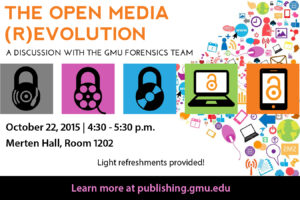 Online access to media has revolutionized how consumers experience music, television, film, and games. Free or low cost distribution and production models allow us to expand our appreciation for new genres and create exciting new material to share.
Online access to media has revolutionized how consumers experience music, television, film, and games. Free or low cost distribution and production models allow us to expand our appreciation for new genres and create exciting new material to share.
Join us on October 22 when student members of the nationally ranked GMU Forensics Team discuss how open media models have changed our role as consumers and as creators of new content. How have they sparked collaboration among established and new partnerships? What does the entertainment industry gain from making their material ‘free’? What are the barriers to this explosion in digital content?
Share your opinions and questions during this free discussion! Light refreshments will be served.
Featured speakers are Samuel Abney, communication major; Natalia Castro, integrative studies; AK Komanduri, government and international politics major; and Nathan Leys, government and international politics major.
Thursday, October 22, 4:30 to 5:30 p.m., Alan and Sally Merten Hall, Room 1202, Fairfax Campus
Info Table
Come pick up some free swag and ask one of our librarians about Open Access to research and open educational resources! The info tables will also feature materials about ORCID (orcid.org), a free service that provides researchers with a unique identifier to distinguish their research activities from those of others with similar names.
Tuesday, October 20 – Thursday, October 22, 4 to 7:30 p.m., Founders Hall Lobby, Arlington Campus
Tuesday, October 20 – Thursday, October 22, Gateway Library and Fenwick Library, Fairfax Campus
Tuesday, October 20 – Thursday, October 22, Mercer Library, Prince William Campus
FRIDAY, OCTOBER 23, 2015
Create a Dynamic Classroom Experience Using Open Educational Resources: a workshop for curious educators
Jane Rosecrans, Karyn Pallay, and Josh Watson (J. Sargeant Reynolds Community College) and Claudia Holland (George Mason University Libraries)
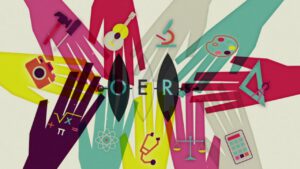 Online access to free learning materials has allowed educators, like you, more freedom and creativity than ever to tailor their courses. You have the freedom to reuse all types of media, to modify content to suit your pedagogy and your students’ learning styles, and to create completely new material. Furthermore, you have the opportunity to reduce textbook costs for your students!
Online access to free learning materials has allowed educators, like you, more freedom and creativity than ever to tailor their courses. You have the freedom to reuse all types of media, to modify content to suit your pedagogy and your students’ learning styles, and to create completely new material. Furthermore, you have the opportunity to reduce textbook costs for your students!
But how do you know when content on the web can be modified and reused? Can you rely on the purported quality of, for example, open textbooks? What can you do to share materials you create with a broader audience and still get credit for the time and effort you put into them? Why consider using anything but the traditional textbook you have selected for a course? You might already be using open resources in your courses. Are you making this cost-savings known to potential enrollees?
The Virginia Community College System is a nationally recognized leader in using and building open educational resources. Join this experienced team of faculty in an interactive two-hour workshop to explore answers to these questions and learn more about the following topics:
- Why OER?
- Defining OER Terms and Concepts
- Finding and Evaluating OER and free course materials
- Building an OER Course
- Understanding Creative Commons Licenses and Applying them to your own course materials
- Evaluating the Quality and Effectiveness of OER materials in your course
- OER and Student Success and Retention
The University Libraries wants to hear how your use of open resources can be supported. Please register for this workshop today and save your place! There are only 35 seats available.
Friday, October 23, 1 to 3 p.m., Johnson Center, Gateway Library Instruction Room, Fairfax Campus
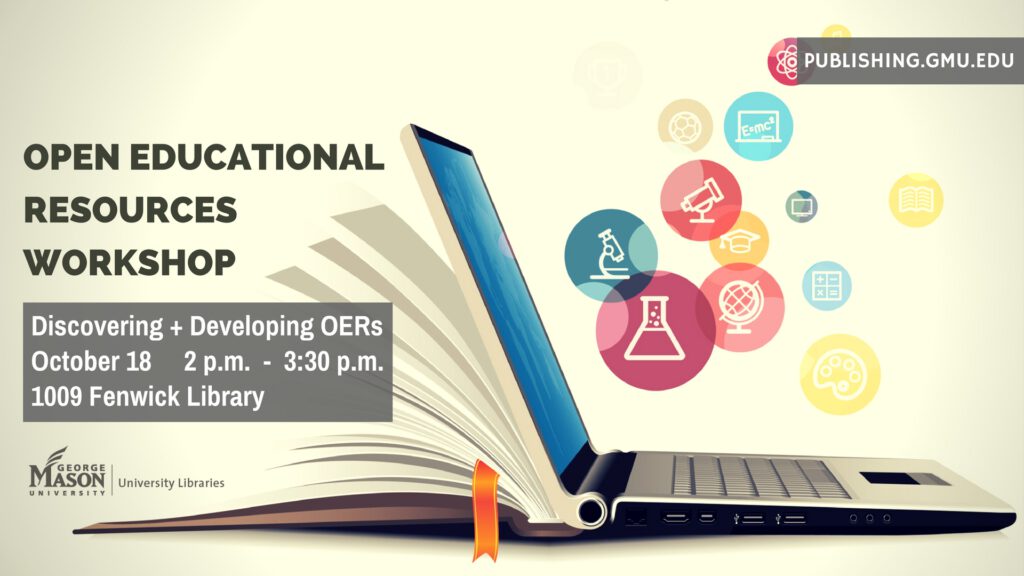
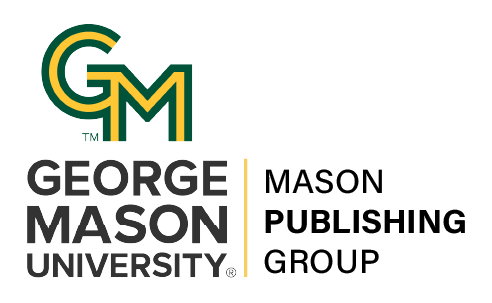
 Curriki is a nonprofit global community that offers free K-12 learning resources for teachers, students, and parents. The resources on Curriki cover a wide range of subjects in the arts and sciences. Curriki offers over 55,000 Open Educational Resources and its 400,000 members represent nearly 200 countries.
Curriki is a nonprofit global community that offers free K-12 learning resources for teachers, students, and parents. The resources on Curriki cover a wide range of subjects in the arts and sciences. Curriki offers over 55,000 Open Educational Resources and its 400,000 members represent nearly 200 countries. Not-for-profit Khan Academy is an organization dedicated to providing a “free world-class education for anyone anywhere.” Content includes interactive challenges, assessments, and video in an array of topics for kindergartners through adult learners. Create an account to practice standardized tests and keep statistics on assignments and coursework you’ve completed, noting your progress as you learn.
Not-for-profit Khan Academy is an organization dedicated to providing a “free world-class education for anyone anywhere.” Content includes interactive challenges, assessments, and video in an array of topics for kindergartners through adult learners. Create an account to practice standardized tests and keep statistics on assignments and coursework you’ve completed, noting your progress as you learn.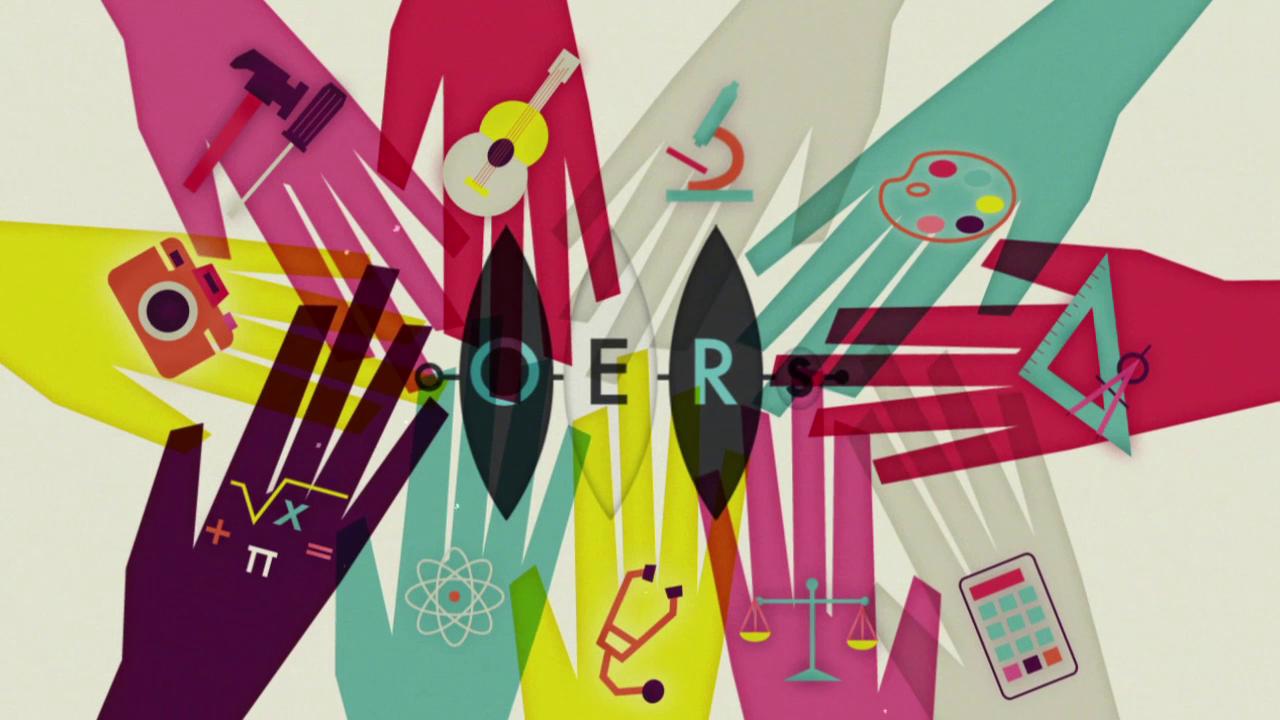

 Online access to media has revolutionized how consumers experience music, television, film, and games. Free or low cost distribution and production models allow us to expand our appreciation for new genres and create exciting new material to share.
Online access to media has revolutionized how consumers experience music, television, film, and games. Free or low cost distribution and production models allow us to expand our appreciation for new genres and create exciting new material to share. Online access to free learning materials has allowed educators, like you, more freedom and creativity than ever to tailor their courses. You have the freedom to reuse all types of media, to modify content to suit your pedagogy and your students’ learning styles, and to create completely new material. Furthermore, you have the opportunity to reduce textbook costs for your students!
Online access to free learning materials has allowed educators, like you, more freedom and creativity than ever to tailor their courses. You have the freedom to reuse all types of media, to modify content to suit your pedagogy and your students’ learning styles, and to create completely new material. Furthermore, you have the opportunity to reduce textbook costs for your students!